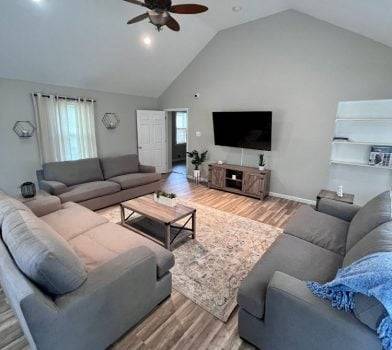For individuals, recovery houses in New Jersey seeking recovery from addiction, sober living homes can be a vital stepping stone on the path to lasting sobriety. These residences provide a supportive, structured environment fostering continued healing and growth.
However, navigating the world of sober living can feel overwhelming, especially with questions about specific requirements and regulations.
This blog is designed to be a clear and informative resource for anyone interested in recovery houses in New Jersey.
We’ll go through the essential requirements for residency, helping you make informed decisions about this crucial step in your recovery journey.
Understanding Sober Living Homes
Sober living homes, also known as recovery homes or transitional housing, are structured living environments designed to support individuals in early recovery from addiction. These residences bridge the gap between inpatient treatment programs and independent living.
Sober-living homes offer several key benefits
- Supportive Community: Encourages belonging and shared experiences.
- Structured Environment: Provides stability and accountability.
- Recovery Support: Offers relapse prevention, life skills, and resources.
- Bridge to Independence: Prepares individuals for self-management and independent living.
Sober Living Homes vs. Rehabilitation Centers:
- Focus: Rehab centers provide intensive addiction treatment, while sober living homes emphasize relapse prevention and reintegration.
- Structure: Rehab centers offer supervised environments, while sober living homes promote independence within guidelines.
- Length of Stay: Rehab programs have fixed durations, whereas sober living stays are flexible based on individual needs.
Benefits of Sober Living Homes
- Reduced Relapse Risk: A supportive environment and structure minimize relapse chances.
- Continued Recovery Support: Access to group meetings and guidance from staff.
- Life Skills Development: Helps with budgeting, meal planning, and job searching.
- Improved Socialization: Fosters positive interactions and communication.
- Preparation for Independence: Equips individuals for a successful transition to independent living.
Admission Criteria
Sober living homes serve a vital role in recovery, but entering one requires navigating specific admission criteria. Understanding these requirements will help you determine eligibility and prepare for the application process.
Eligibility Requirements
While specific criteria may vary between facilities, some common factors are considered during the application process:
- Age: Typically 18 or 21 years old.
- Sobriety: Demonstrated commitment to sobriety, often with a minimum clean period or completion of a treatment program.
- Program Completion: Some homes require prior completion of a treatment program.
- Financial Stability: Residents must cover costs; proof of financial stability may be required.
- Commitment to Rules: Willingness to follow established guidelines promoting recovery.
The Application Process:
The application process typically involves
- Form: Complete an application form with basic background and recovery information.
- Interview: Assessment of suitability and addressing questions.
- Reference Checks: Possibly from past treatment providers or individuals familiar with your recovery.
- Documentation: Provide proof of identification, residency, and potential income verification.
House Rules and Expectations
Sober living homes offer a structured environment fostering healthy habits and preventing relapse. This structure comes with a set of house rules and expectations that residents must adhere to. Understanding these guidelines is essential before entering a sober living home.
General rules and regulations common to sober living homes
While specific rules may vary, some general principles are common across many sober living homes:
- No Substance Use: Strict prohibition of alcohol and drugs.
- Testing: Regular tests ensure sobriety commitment.
- Curfews and Visitors: Establish routine and safety.
- Behavior Expectations: Respectful conduct and conflict resolution.
- Meeting Participation: Sharing, support, and learning.
- Recovery Program Engagement: Involvement in external programs.
- Chores: Shared responsibilities for community well-being.
Benefits of Adherence
- Promotes Stability: Structure and routine foster healthy habits.
- Reduces Relapse Risk: Clear expectations discourage risky behaviors.
- Develops Life Skills: Residents learn responsibility and communication.
- Strengthens Support: Group meetings foster a supportive community.
By understanding and adhering to house rules and expectations, residents can maximize the benefits of a sober living environment and move closer to achieving lasting sobriety.
Support Systems and Services
Sober living homes go beyond simply providing a roof over your head; they offer a comprehensive support network to empower your recovery journey. Here, we explore the various support systems and services many sober living homes provide.
On-Site Support
- Counseling: Some homes have on-site counselors or therapists who offer individual or group counseling sessions to address addiction-related issues and develop coping mechanisms.
- Case Management: Case managers can connect residents with essential resources, assist with goal setting, and provide ongoing support throughout their stay.
External Resources
- Community Connections: Sober living homes may facilitate access to a network of community resources, including job training programs, educational opportunities, and support groups. This empowers residents to rebuild their lives outside of the program.
The Power of Peers
- Peer Support: Living alongside others in recovery fosters a strong sense of community and shared experience. Residents can offer emotional support, encouragement, and accountability to one another.
- Mentorship: Some facilities offer mentorship programs where experienced residents guide newcomers, providing valuable insights and support during the early stages of recovery.
Addressing Medical and Mental Health Needs
- Medical Care: While sober living homes may not provide direct medical care, they can often connect residents with healthcare providers who specialize in addiction treatment and understand the unique needs of individuals in recovery.
- Mental Health Services: Similar to medical care, some homes may facilitate access to mental health professionals who can address co-occurring mental health conditions that may contribute to addiction.
The Synergy of Support
The combination of on-site and external support systems, coupled with the power of peer support and access to medical and mental health services, creates a well-rounded support network within a sober living home. This comprehensive approach empowers residents to heal, develop life skills, and build a strong foundation for lasting sobriety.
Transitioning Out of Sober Living
Sober living homes provide a valuable stepping stone, but the ultimate goal is successful independent living. This section explores the transition process and resources available to ensure a smooth and sustainable path forward.
Preparing for Independence
Sober living homes prepare residents for independent living through:
- Life Skills Training: Covers budgeting, meal planning, time management, job skills, and communication.
- Financial Planning: Workshops and sessions help manage finances for housing and expenses.
- Relapse Prevention: Personalized plans identify triggers, coping strategies, and access to support.
- Building Support Network: Encourages maintaining connections with peers and supportive friends/family.
Continuing the Journey
- Aftercare Programs: Offer ongoing support like therapy sessions and group meetings.
- Alumni Networks: Connect former residents, fostering community and support.
Criteria for Successful Transition
Discharge planning is a collaborative effort between residents, staff, and potentially loved ones. By carefully evaluating these criteria, individuals and their support network can determine readiness for independent living:
- Sobriety Maintenance: Consistent sobriety record during the stay.
- Life Skills: Independent management of daily tasks like cooking and budgeting.
- Support System: Network of supportive family, friends, and peers.
- Relapse Prevention: Clear plan to manage triggers and access support.
- Continued Commitment: Active participation in therapy and support groups.
By planning for discharge and actively participating in transition preparation programs, individuals can confidently embark on a healthy and sustainable journey beyond the supportive environment of a sober living home.
FAQs
1. What is another name for sober living homes?
Another commonly used term for sober living homes is halfway houses. These residences serve as transitional living environments for individuals in recovery from addiction. They provide a supportive and structured setting where residents can continue their journey toward sobriety while gradually reintegrating into society.
2. What are the requirements for sober living in New Jersey?
The licenses stipulate that the homes must be “residential settings exclusively designed as residences for individuals recovering from drug or alcohol addiction. These homes are intended to foster an environment where residents can mutually support each other’s journey towards sobriety and recovery.”
3. What is supportive housing in NJ?
Supportive housing aims to offer individuals receiving mental health services access to permanent, safe, and affordable housing options of their preference.
4. What is SAMHSA’s definition of recovery housing?
Recovery housing represents a recovery support service crafted by individuals in recovery, tailored specifically for those embarking on and maintaining recovery from substance use disorders. Rooted in social model recovery principles, the setting of recovery housing serves as the service itself.
Conclusion
It’s crucial to prioritize meeting the requirements for sober living to ensure a supportive and structured environment conducive to healing and growth. We encourage anyone considering sober living as part of their recovery journey to explore the options available and reach out for support.
If you’re ready to take the next step toward recovery, consider contacting sober living homes in New Jersey for more information.
Remember, you’re not alone on this journey, and support is available to help you every step of the way.
For more resources, support services, and information on sober living in New Jersey, don’t hesitate to contact Bhouses or explore further reading materials.
Your journey to lasting sobriety starts here.










